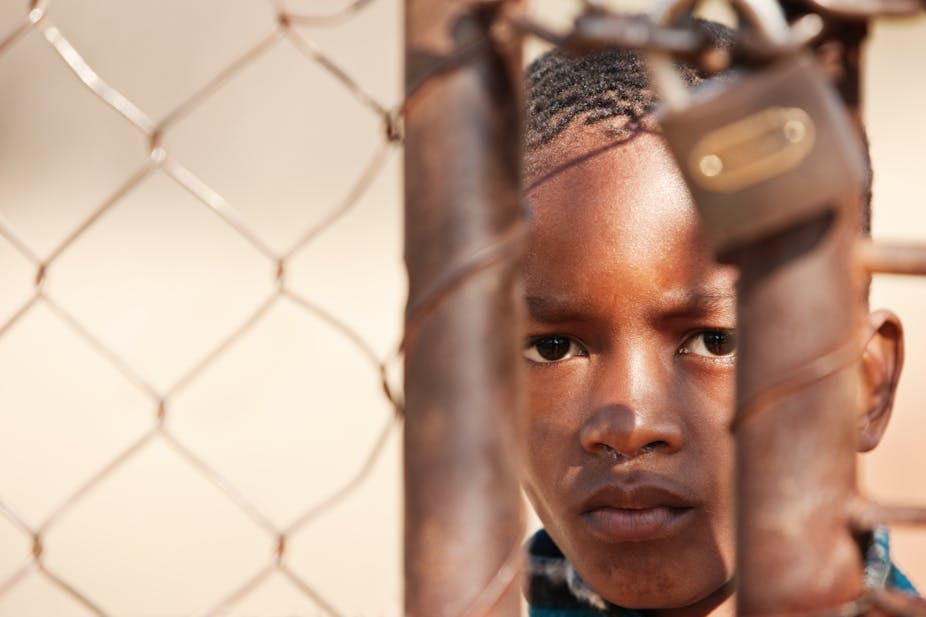Millions of children throughout Africa don’t have access to justice that’s needed to realise their rights.

Many children don’t receive the treatment they deserve. Shutterstock
Simply put, they don’t receive the treatment they deserve as victims, witnesses, children with welfare needs, children in conflict with the law, the subject of parental disputes about care, contact and maintenance, and as potential claimants for redress when their rights have been violated.
There are several reasons for this. For instance, African justice systems are often hard to reach; courts are usually situated in large towns. Another barrier is that in most countries children cannot approach a court in their own right.
On the continent, only South Africa has a widespread legal aid system that’s available and accessible to children.
We know what child-friendly justice looks like. Its key elements were identified at a conference in Kampala, Uganda in 2011. The conference led to the formulation of Guidelines on Action for Children in Justice Systems in Africa.
But one important area has been largely overlooked: the role that informal justice systems can play in realising justice for children. People often choose these informal and largely traditional systems over more formal processes. That’s because they don’t trust the formal justice system, struggle to access it, cannot afford the travel costs to get to court and find the long delays in adjudication off-putting.
A recent study that I was involved in set out to understand how much children interact with informal justice systems in selected African countries. Our findings were instructive.
It appears that when children are drawn into their countries’ informal justice systems, their human rights are often threatened.
That’s not to say informal justice mechanisms must be entirely abandoned. They play an important role in communities, often focusing on restorative justice and taking a conciliatory approach which serves to rebuild relationships and secure peace in communities. They are also close to the communities they serve, and familiar with local issues.
The answer to these human rights concerns is to strengthen communities’ capacity to access and navigate the formal justice system. Only then will formal court structures become the preferred option for seeking justice.
What the study found
We know that informal justice systems are working in several countries, as shown by case studies undertaken in Egypt, Sierra Leone and Tanzania as part of the broader research report.
But there are issues with these traditional, informal settings. For instance, gender power imbalances may be reinforced so that girls in particular get a raw deal.
As an example, sexual offences may be dealt with through mediation between a young victim’s family and that of their abuser. This does not secure any justice for the violated child.
Children will not enjoy legal representation or the right to an appeal. Their voices may be muted, as others speak for them (such as elders). This denies their right to participate in proceedings affecting them.
It’s not entirely negative, though. One particular advantage of informal justice outlined in the study is that it does not resort to deprivation of children’s liberty through detention or incarceration. In this way it upholds the injunction in the Convention on the Rights of the Child that deprivation of liberty be used as a last resort. Instead, sanctions include reparations, restitution and fines.
Some positive steps
It would be incorrect to tar all African countries with the same brush when it comes to child justice. Many have made noteworthy advances. Many, among them Malawi and Mauritania, have launched specialised children’s courts.
Specialised police units dedicated to dealing with offences against children have also been set up in places like Zanzibar and Namibia. These ensure that dedicated services (including forensic services) are on hand, and that the child victim’s inevitable trauma is reduced. Another promising practice is the introduction of child rights focused modules in police training programmes, as seen in Namibia and Zambia.
These are positive steps in the right direction. But more work is needed. For instance, specialised children’s courts tend only to be located in capital cities and a few big towns. They are not readily accessible by the majority.
And, although specialised courts ought to be staffed by specialised personnel, this is not always the case. The support of social workers is also vital, but social workers are in short supply in most African countries. Those who are in the system tend to be overworked and under-trained.
The jury is out on whether informal justice systems have a role to play here. Some see informal justice as entrenching human rights violations but a necessary player – for now. Others view informal justice more benignly and can tolerate its coexistence with formal systems. My view is that while informal systems have a role, access to formal justice should be improved.
Way forward
This can be done in several ways.
Children need adequate information about their rights and role in justice processes. This can happen in a variety of ways and formats, including at school. Another important step is to constantly train justice and police officials, probation officers and social workers about children’s developmental and other needs.
Judicial proceedings, where these are necessary, should be adapted to enable children’s meaningful participation. Children should also be informed of the outcome of justice processes, and what implications a ruling or decision might have.
Children’s rights are generally not embedded in African countries’ justice systems. Our recent study highlights the need for services that are truly child sensitive to be progressively augmented, and for laws and institutions that are meant to protect children’s rights to be properly resourced.
Julia Sloth-Nielsen, Professor, Department of Public Law and Jurisprudence, University of the Western Cape and Professor of Children’s Rights in the Developing World, University of Leiden, University of the Western Cape
This article is republished from The Conversation under a Creative Commons license. Read the original article.
